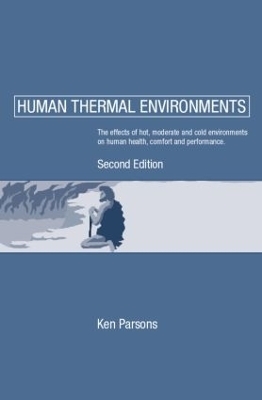
Human Thermal Environments
The Effects of Hot, Moderate, and Cold Environments on Human Health, Comfort and Performance, Second Edition
Seiten
2002
|
2nd edition
CRC Press (Verlag)
978-0-415-23793-2 (ISBN)
CRC Press (Verlag)
978-0-415-23793-2 (ISBN)
This remains the standard text for the design of environments for humans to live and work safely, comfortably and effectively, and for the design of materials which help the same people cope with their environments.
Our responses to our thermal environment have a considerable effect on our performance and behavior, not least in the realm of work. There has been considerable scientific investigation of these responses and formal methods have been developed for environmental evaluation and design. In recent years these have been developed to the extent that detailed national and international standards of practice have now become feasible.
This new edition of Ken Parson's definitive text brings us back up to date. He covers hot, moderate and cold environments, and defines these in terms of six basic parameters: air temperature, radiate temperature, humidity, air velocity, clothing worn, and the person's activity. There is a focus on the principles and practice of human response, which incorporates psychology, physiology and environmental physics with applied ergonomics. Water requirements, computer modeling and computer-aided design are brought in, as are current standards. Special populations, such as the aged or disabled and specialist environments such as those found in vehicles are also considered.
This book continues to be the standard text for the design of environments for humans to live and work safely, comfortably and effectively, and for the design of materials which help the same people cope with their environments.
Our responses to our thermal environment have a considerable effect on our performance and behavior, not least in the realm of work. There has been considerable scientific investigation of these responses and formal methods have been developed for environmental evaluation and design. In recent years these have been developed to the extent that detailed national and international standards of practice have now become feasible.
This new edition of Ken Parson's definitive text brings us back up to date. He covers hot, moderate and cold environments, and defines these in terms of six basic parameters: air temperature, radiate temperature, humidity, air velocity, clothing worn, and the person's activity. There is a focus on the principles and practice of human response, which incorporates psychology, physiology and environmental physics with applied ergonomics. Water requirements, computer modeling and computer-aided design are brought in, as are current standards. Special populations, such as the aged or disabled and specialist environments such as those found in vehicles are also considered.
This book continues to be the standard text for the design of environments for humans to live and work safely, comfortably and effectively, and for the design of materials which help the same people cope with their environments.
Ken Parsons
Preface. Acknowledgements. Notation. Human Thermal Environments. Human Thermal Physiology and Thermoregulation. Psychological Responses. Dehydration and Water Requirements. Measurement Methods and Assessment Techniques. Metabolic Heat Production. The Thermal Properties of Clothing. Thermal Comfort. Thermal Comfort for Special Populations, Special Environments and Adaptive Modeling. Heat Stress. Cold Stress. Interference with Activity Performance and Productivity. Human Skin Contact with Hot, Moderate and Cold Surfaces. International Standards. Thermal Models and Computer Aided Design. Appendix1. Fundamentals of Heat Transfer. Appendix 2. Psychometrics. References. Index.
| Erscheint lt. Verlag | 26.12.2002 |
|---|---|
| Verlagsort | London |
| Sprache | englisch |
| Maße | 156 x 234 mm |
| Gewicht | 771 g |
| Themenwelt | Naturwissenschaften ► Biologie ► Ökologie / Naturschutz |
| Naturwissenschaften ► Geowissenschaften ► Meteorologie / Klimatologie | |
| ISBN-10 | 0-415-23793-9 / 0415237939 |
| ISBN-13 | 978-0-415-23793-2 / 9780415237932 |
| Zustand | Neuware |
| Haben Sie eine Frage zum Produkt? |
Mehr entdecken
aus dem Bereich
aus dem Bereich


